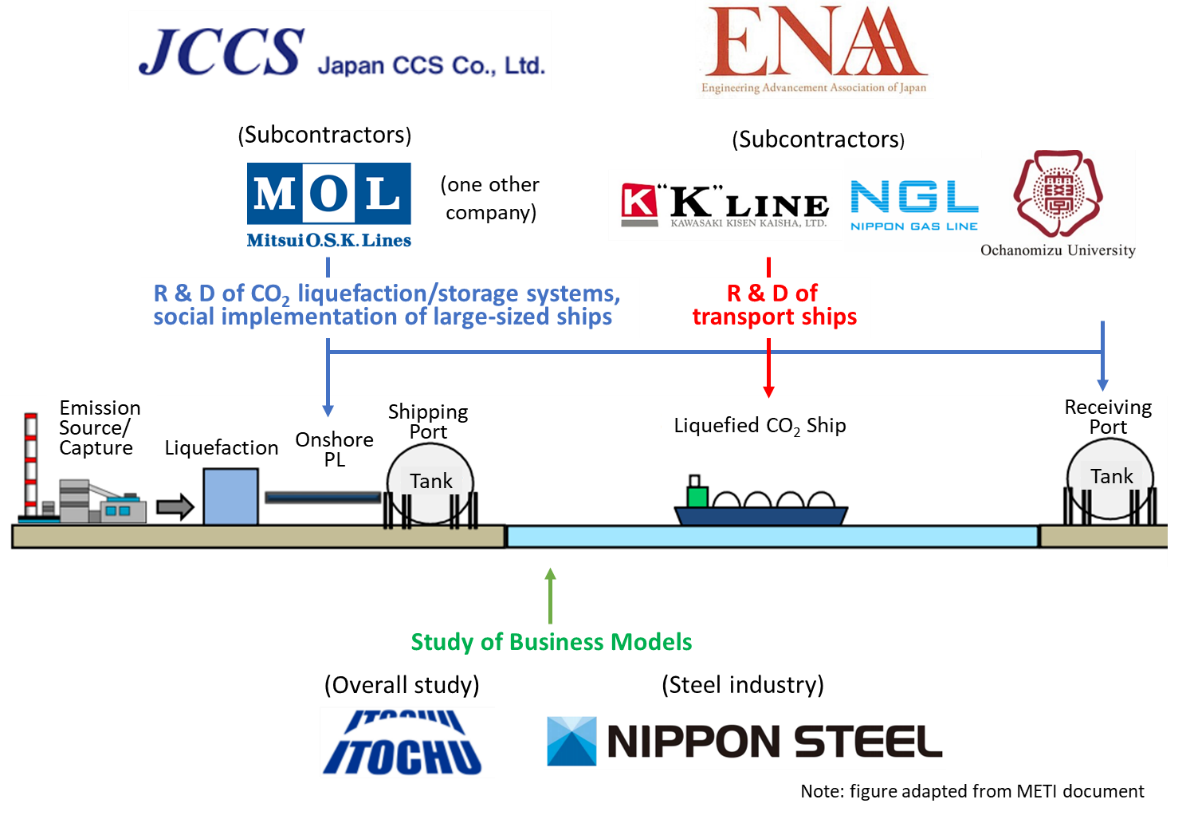Four Companies to Commence Research, Development and Demonstration Projects on CO2 Ship Transportation
June 22, 2021
This is to inform that Japan CCS Co., Ltd. (hereinafter "JCCS"), Engineering Advancement Association of Japan (hereinafter "ENAA"), ITOCHU Corporation (hereinafter "ITOCHU"), NIPPON STEEL CORPORATION (hereinafter "NIPPON STEEL") jointly applied as a consortium for "CCUS R&D and Demonstration Related Projects", which was publicly announced by the New Energy and Industrial Technology Development Organization (hereinafter "NEDO"), and have been awarded the contract "Research, Development and Demonstration Projects on CO2 Ship Transportation".
The "Long-Term Strategy under the Paris Agreement as Growth Strategy", adopted by the Cabinet in June 2019, clearly states the importance of the role of CCUS/Carbon Recycling as a means to significantly reduce CO2 emissions from the use of fossil fuels, while also pointing out the challenge of transporting CO2 due to the distances between CO2 emission sources and storage sites, and asserts that "as a public-private initiative, it is necessary to create a situation where the private sector can make investment decisions by designing appropriate business models to transport CO2 safely and at low cost. " In addition, the "Green Growth Strategy Through Achieving Carbon Neutrality in 2050" formulated by the Ministry of Economy, Trade and Industry (METI) in collaboration with related ministries and agencies in December 2020, states that it is extremely important to promote technology development and social implementation to realize a decarbonized society in order to solve the climate change issue, and aims to establish innovative technologies that will enable the reduction of CO2 (Beyond-Zero) by 2050.
With a view towards the social implementation of CCUS around 2030, the consortium will jointly conduct research and development of transportation technology regarding the transportation of CO2 from emission sources to utilization/storage points at a scale of 1 million tonnes per year, which will lead to long-distance/mass transportation of CO2 and cost reduction and will also aim to establish ship transportation technology for liquefied CO2 through demonstration and related surveys. Specifically, the consortium will engage in the following research and development, demonstration, and surveys.
(1) Research and development to establish ship transportation technology for liquefied CO2 (JCCS, ENAA)
The consortium aims to establish technology for storing and transporting liquefied CO2, which is the key to realizing mass transportation of CO2. In particular, the ensurance of safety including the control of dry ice formation is an important issue for research and development. Also, the consortium will proceed preparations for the social implementation of liquefied CO2 ship transportation such as engaging in the basic design of ships and formulation of international rules.
(2) Demonstration of CO2 ship transportation at a scale of 10,000 tonnes per year (JCCS, ENAA)
In order to consider the technical issues identified in (1) through demonstration, a demonstration vessel capable for transporting about 1,000 tons of liquefied CO2 will be prepared and operated in about 10 voyages per year. Regarding the onshore facilities for the demonstration, the consortium plans to set up a shipping terminal in Maizuru (premises of Kansai Electric Power Co., Inc. power plant) and a receiving terminal in Tomakomai.
(3) Study of ship transportation business models for the purpose of CCUS (ITOCHU, NIPPON STEEL)
Aiming to realize the CO2 collection and transportation business, the consortium will conduct a study on business models regarding CO2 transportation from various mass CO2 emission sources in Japan, including the steel industry.
Research and development on specific issues will be conducted together with subcontractors*.
-
*Subcontractors:
Mitsui O.S.K. Lines, Kawasaki Kisen Kaisha, Ltd., NIPPON GAS LINE CO., LTD., Ochanomizu University, and one other company
CCUS is an acronym for Carbon dioxide Capture, Utilization and Storage, and is a technology that can contribute to the reduction of carbon dioxide emissions by effectively using CO2 as a resource and storing it underground.
Through this research and development, JCCS, ENAA, ITOCHU, and NIPPON STEEL aim to contribute to a sustainable decarbonized society through the realization of the social implementation of CCUS.
Image of Demonstration Project
|
|

